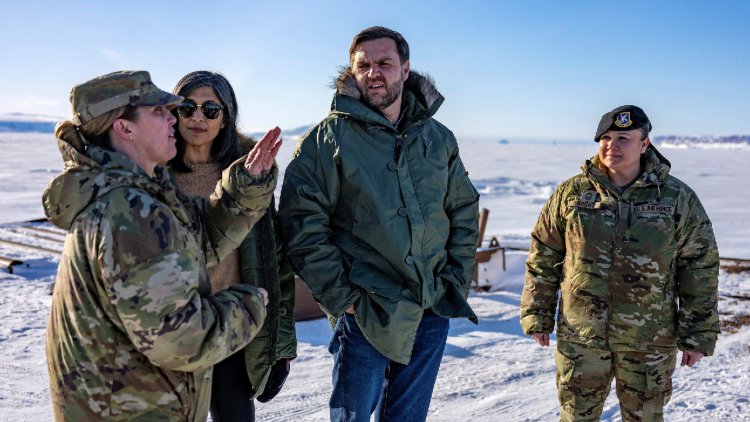Denmark Responds to U.S. 'Tone' Following Vance's Greenland Trip
U.S. Vice President JD Vance criticized Denmark for "not doing a good job by the people of Greenland."

U.S. President Donald Trump has made public remarks on multiple occasions about the potential annexation of the semi-autonomous Danish territory of Greenland.
On Friday, U.S. Vice President JD Vance, along with national security advisor Mike Waltz, visited U.S. troops stationed in Greenland.
In his remarks to personnel, Vance criticized Denmark for "not doing a good job by the people of Greenland."
"Our message to Denmark is very simple. You have not done a good job by the people of Greenland," Vance stated. "You have underinvested in the people of Greenland, and you have underinvested in the security architecture of this incredible, beautiful landmass filled with incredible people. That has to change. And because it hasn't changed, this is why President Trump's policy in Greenland is what it is."
Vance asserted respect for Greenland's sovereignty, but also implied that the territory could benefit from partnering with the U.S.
Denmark's foreign minister, Lars Lokke Rasmussen, responded to Vance's comments.
"Much is being said these days. Many accusations and many allegations have been made. And of course, we are open to criticism. But let me be completely honest. We do not appreciate the tone in which it is being delivered," Rasmussen remarked.
"This is not how you speak to your close allies. And I still consider Denmark and the United States to be close allies. We respect that the United States needs a greater military presence in Greenland, as Vice President Vance mentioned. We, Denmark and Greenland, are very much open to discussing this with you, with an open mind."
Rasmussen noted that the existing defense agreement from 1951 provides ample opportunity for the U.S. to enhance its military presence in Greenland.
"In 1945, the United States had 17 bases and military installations in Greenland, with thousands of soldiers. Today, only one American base is left. The one Vice President Vance visited a few hours ago, and something like 200 soldiers. We can do more, much more, within the framework we have today. Let us make use of that. And let us do it together," he emphasized.
President Trump reiterated his views on Greenland during a media event in the Oval Office.
"We need Greenland, very importantly for international security. We have to have Greenland. It's not a question of 'do you think we can do without it?'" Trump stated. "We're not talking about peace for the United States, we're talking about world peace. We're talking about international security."
As for Greenland's perspective on potentially becoming part of the U.S., polls indicate that nearly all Greenlanders oppose such a move.
Significant anti-American demonstrations have taken place in the territory, with protesters wearing "Make America Go Away" caps and holding signs that read "Yankees Go Home." On Thursday, residents in the capital, Nuuk, placed Greenlandic flags in the snow alongside a sign stating, "Our Land. Our Future."
Political analyst and advisor Qarsoq Hoegh from Greenland's Naleraq Party likened the situation to "like a B-movie."
"World leaders jumping in, surprise visits, shifting rhetoric... Greenlanders are unified in one thing: we don't want to be Danes, and we don't want to be Americans. We want to be Greenlanders," Hoegh commented.
Local sentiments were also very clear. One resident declared, "I don't want to be bought by Trump - or anyone," referring to Trump's 2019 proposal to purchase Greenland. "We are not for sale. JD Vance represents a government that joked about buying us. That's not diplomacy. That's colonialism."
Another resident added, "We want to govern ourselves without interference from Denmark or the USA. Tell JD Vance: we don't want you here. Don't come back."
Shortly before Vance's visit, major political parties in Greenland announced a groundbreaking coalition, uniting 75 percent of the electorate. Analysts suggest this timing was a direct response to the visit, signaling a growing political movement towards greater autonomy.
Hoegh remarked, "It would be naive to say the visit had no impact. But what it sparked wasn't goodwill - it was resentment. This new coalition is openly pushing for increased autonomy. The United States, Denmark, the EU - they've all played a role in our story. But Greenland wants to write the next chapter ourselves."
Mark B Thomas for TROIB News












